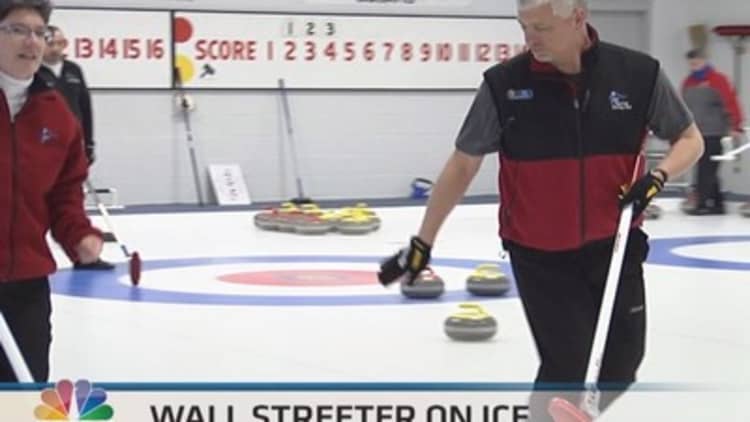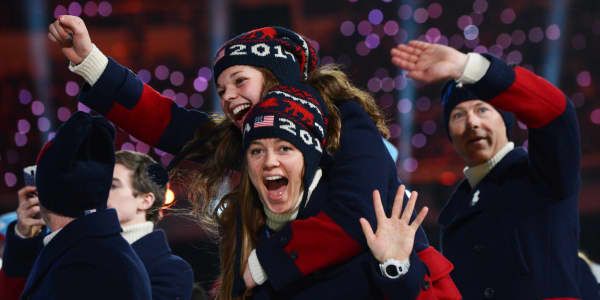
Winning on Wall Street means staying focused, coordinating the moving parts of small teams, countering rivals who are trying to edge you out of the money and setting yourself up for the best chance to close the deal.
That also happens to be what it takes to win in Olympic curling.
"Curling is fiercely competitive," said Nigel Lucas, a New York-based portfolio sales trader for brokerage and investment group CLSA, who also acts as treasurer for Nutmeg Curling Club in nearby Bridgeport, Conn. "It looks slow, but it's not. You're not just thinking what are you going to do, but what is the other guy going to do."
It isn't possible to accurately measure curling's popularity on Wall Street, but anecdotal evidence suggests that the sport has a growing fan-base in the investing world that's been reinforced by successive Winter Games. CNBC has carried Olympic curling for multiple consecutive Olympics, and it consistently rates as one of the highest-rated daily programs in its 5 p.m. slot, after the trading day ends.
"If you look at it like a trend, like you would look at a chart, the trend is up," Lucas said.
Curlers work in small teams, literally screaming coded information to one another on a 140-foot frozen "sheet" over which no one member of the squad can gain a commanding view alone. Curlers follow the leadership of a "skip" who calls the shots.
Paul Baard, an organizational sports psychologist at Fordham University, said that that emphasis on strategic thinking and the ability to make quick adjustments to a changing situation is very similar to the work of Wall Street.
(Read more: Russian TV announcers: Go Russia! Boooo, Team USA!)
"Traders work in small teams, and to close a deal, you work in a small team," he said. "And there's major pressure. You either win that game, or you lose it."
Baard compared curling to chess—and deal-making—because "you make an offer anticipating what your competitor is going to do. And you're also making yourself ready to make a counter to your opponent's counters."
Sanjay Nath, who grew up playing competitive chess and works as director of the Institute for Graduate Clinical Psychology at Widener University, agreed with Baard. Wall Streeters "want to watch the market and anticipate what's going to happen, and they want to do that before their peers do," he said. "You get the same thing in curling."
(Read more: Congrats on the Olympic medal—now get back to work)
The ability to determine probabilities is a skill that's critical in both settings as well, Nath said. Curlers try to close with as many points as possible when they deliver the "hammer," or the final stone that marks the actual physical execution of the strategy the team has been building toward.
"It's about abstract reasoning—can you think on your feet and get to the next step?" he said. "But you're also wanting to see the chances of whether they'll technically be able to do it or not."
Some Wall Streeters have also taken notice of the same odds-making possibilities that curling offers.
Raj Mahal, a former trader at Bank of America, told CNBC that he required junior traders to handicap curling teams during the last Winter Games, in Vancouver in 2010.
"I would take five or six junior traders and say, 'OK, you have three minutes. Come up with a betting line,'" he said. "It was an exercise to see how their minds worked and how they handicapped when they didn't know anything at first about how the game worked."
"After the third or fourth time, the splits were coming in pretty similar," Mahal added. "So I could see they were getting better at it."
(Read more: What's that medal worth? Hint: Forget the gold)
The BofA traders examined how teams had performed in previous match-ups and then extrapolated that data to set odds on future outcomes, Mahal said.
"Honestly, I had no idea what the real odds were," Mahal said. "Then surprisingly, when I back-tested the traders, they were pretty close."
Canada, Great Britain, China and Sweden will play for the men's curling finals on CNBC on Friday at 8:30 am ET.
—By CNBC's Ted Kemp. Follow him on Twitter at @TedKempCNBC.





